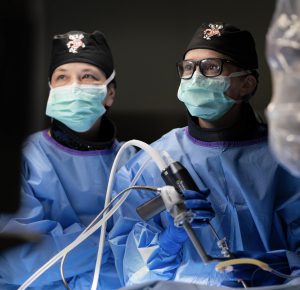Urology Preparation Program
PGY-1
 During the first year of training, you will spend six months on Urology and six months on various surgical services. In addition to general surgery, rotations may include trauma, critical care, colorectal surgery, and transplant surgery. Your first year will provide you with experience managing surgical patients on the floor as well as allow you to refine your basic surgical skills in preparation for urology training.
During the first year of training, you will spend six months on Urology and six months on various surgical services. In addition to general surgery, rotations may include trauma, critical care, colorectal surgery, and transplant surgery. Your first year will provide you with experience managing surgical patients on the floor as well as allow you to refine your basic surgical skills in preparation for urology training.
The general surgery rotations are divided between UW Hospital, William S. Middleton VA Hospital, Meriter Hospital, and East Madison Hospital.
Urology Residency Program
PGY-2
The second year is spent on the UW urology service, the pediatric urology service, and the VA service. The UW urology service consists of a rotation on the benign disease/conditions service and eight weeks assigned to night float. Rotations consist of time spent in Urology clinic, the operating room, and on the inpatient service. The surgical emphasis is on endoscopic and open surgical skills that progress with a graded level of responsibility. You will rotate every two months with emphasis on pediatrics (four months), benign urologic disease and conditions and consults (two months), night float (eight weeks) and VA urology (four months).
PGY-3
The third year consists of four months (split into two two-month blocks) on the UW urology oncology rotation, eight weeks on night float, and four months on the Meriter Hospital urology service. At Meriter you will benefit from exposure to a managed care environment. You will receive significant operative experience in all aspects of urology.
PGY-4
During your fourth year, you will spend four months (split into two two-month blocks) on the combined Meriter/UW Health EMH rotation, and four months at the VA Hospital, which adjoins UW Hospital. While at the VA Hospital, you are given primary responsibility for patient management and care. The remaining four months are divided into two two-month elective rotations, allowing you to focus your education on clinical areas of interest.
PGY-5
During your fifth year, the emphasis is on major operative urologic cases as the Chief Resident. The year, again, is divided into two-month rotations, alternating between UW Hospital, oncology and benign rotations, and UW Chief of Service rotations.
Clinical experiences will give you broad exposure to general urology, urologic oncology, stone disease, infertility, female urology, neurourology, and pediatric urology. You will benefit from multi-disciplinary clinics in each specialty, a philosophy that is strongly embraced at UW Hospital and Clinics. A high volume of experience in office-based procedures like cystoscopy with stent removals and placements, urodynamics, prostate biopsy, vasectomy, and many more will also be included.
More About Our Program
Graduate Medical Education at UW Health-Urology Program
– Dr. Williams, Program Director and Dr. Gerber, Chief Resident
“Structure of the UW Urology Residency Training Program”
– Dr. Williams, Program Director and Vice-chair for Education
“Leadership”
– Dr. Nakada, Chair of Department of Urology
Regional Urology
– Dr. Paolone, Vice-chair for Regional Urology
Veterans Affairs
– Dr. Richards, Chief of VA Urology and Associate Program Director
UW Health Resident and Fellow Handbook
Please direct any questions regarding application process to:
Denise Mussehl
Educational Programs Manager
Phone: (608) 265-2910
E-mail: mussehl@urology.wisc.edu